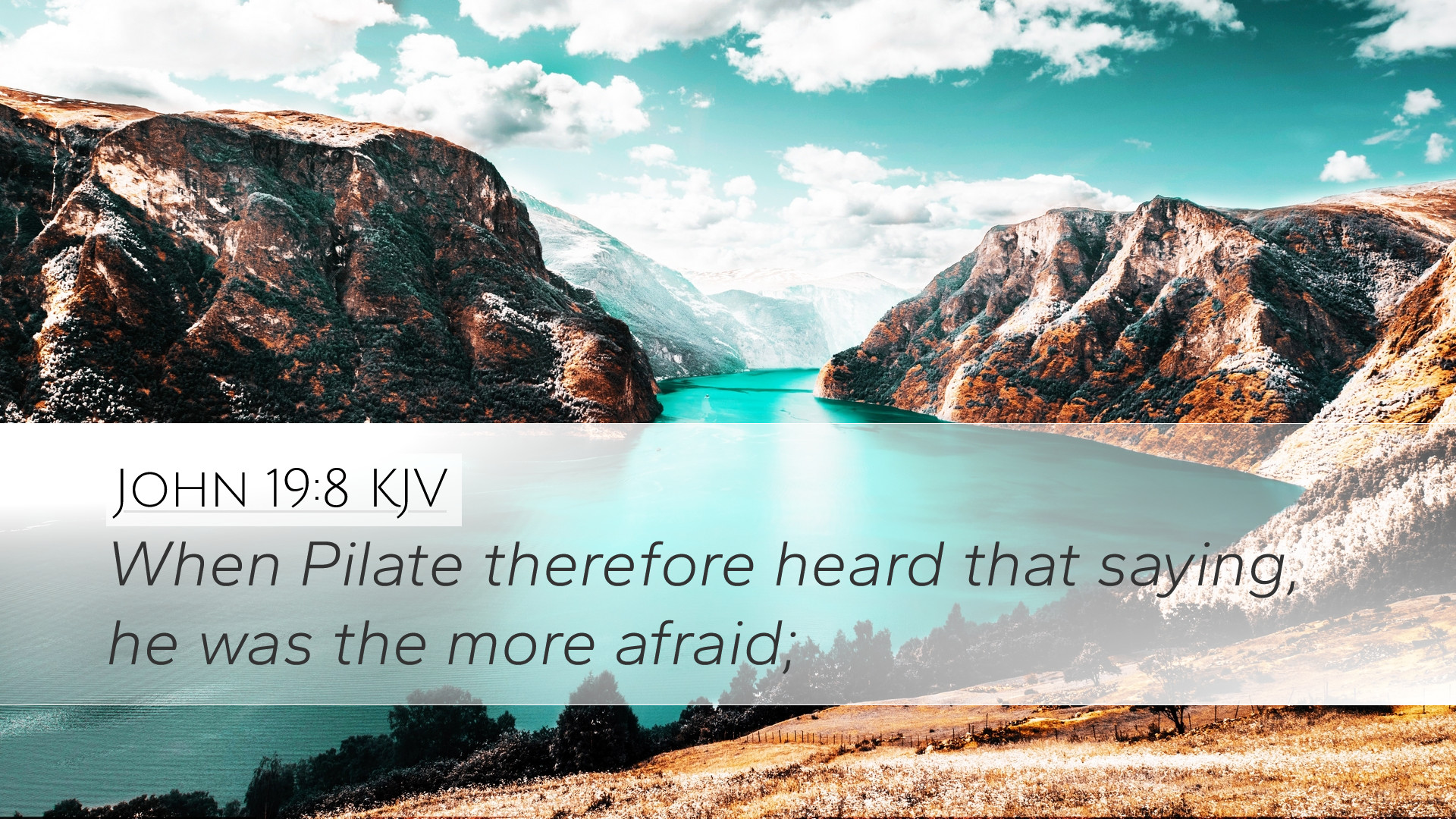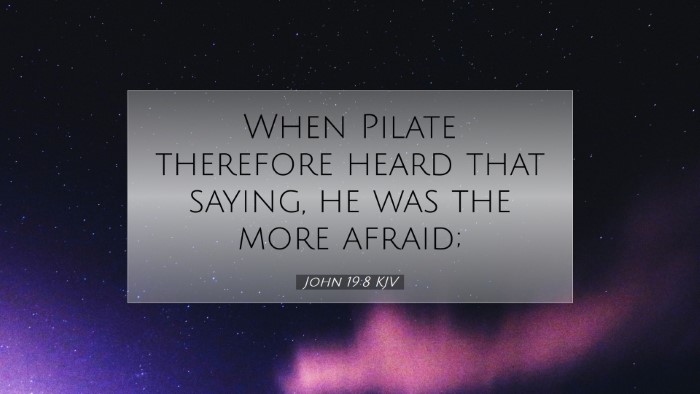Commentary on John 19:8
John 19:8 states: "When Pilate therefore heard that saying, he was the more afraid." This verse captures a pivotal moment in the trial of Jesus Christ, showing the tension and fear that Pilate experiences as he grapples with the implications of his authority and the claims of Jesus.
Contextual Background
The context of John 19:8 is essential to understanding its implications. Pilate, the Roman governor, is confronted by the religious leaders of the Jews who insist on the crucifixion of Jesus. The atmosphere is charged with political and spiritual significance, as Pilate navigates his responsibilities as a ruling official while facing the moral quandary of condemning an innocent man.
Insights from Matthew Henry
Matthew Henry, in his comprehensive commentary, highlights Pilate's increasing apprehension. He points out that Pilate's fear stems from the weight of the accusations against Jesus, particularly the claim of Jesus being the Son of God. Henry elaborates:
- Fear of Divine Judgment: Pilate's fear is indicative of a deeper awareness of divine authority. He recognizes that condemning Jesus may have catastrophic spiritual consequences.
- Conflict of Authority: The tension between Pilate's civil authority and the divine identity of Christ creates a profound internal conflict, as Pilate is unprepared for the reality of who Jesus is.
- Contrast with Jewish Leaders: Henry contrasts Pilate's fear with the hardened hearts of the Jewish leaders, illustrating how some were blind to the spiritual implications of their actions.
Insights from Albert Barnes
Albert Barnes provides additional dimensions to the understanding of fear in Pilate's heart. His commentary focuses on:
- The Source of Fear: Barnes emphasizes that Pilate’s dread is heightened by the circumstances surrounding Jesus’ claims and the ominous nature of the Jewish leaders’ demands.
- Political Pressure: He notes that Pilate's fear is not solely spiritual but also stems from political ramifications of the trial, including the potential backlash from the Jewish populace.
- Awareness of Innocence: Barnes underlines that Pilate is aware of Jesus' innocence, which exacerbates his struggle, accentuating the moral weight of his decision.
Insights from Adam Clarke
Adam Clarke offers a historical and theological perspective on the fear experienced by Pilate. He notes:
- Psychological Turmoil: Clarke elucidates the inner conflict Pilate faces; he is torn between his duty to maintain order and his growing recognition of Jesus’ divine nature.
- Fear as a Universal Response: He comments on the universality of fear when faced with the divine; Pilate's response can be seen as a reflection of humanity's instinctive recognition of higher powers.
- Symbolism of Judgment: Clarke ties Pilate’s fear to foreshadowing of judgment, illustrating that this moment serves as a significant turning point both in Pilate’s life and in the unfolding narrative of salvation.
Theological Implications
Understanding John 19:8 is crucial for grasping the broader theological implications of the crucifixion narrative:
- Divine Sovereignty: The fear of Pilate signifies the ultimate sovereignty of God. Despite the political machinations at play, God’s plan for redemption unfolds, demonstrating His control over human affairs.
- The Human Response to the Divine: Pilate’s fear illustrates a common human response to the confrontations with divine truth and authority, highlighting a theme throughout scripture.
- Foreshadowing Redemption: The escalating tension in Pilate’s heart foreshadows the greater conflict to come, underscoring Jesus’ mission and the necessity of His sacrificial death.
Conclusion
John 19:8 encapsulates a dramatic moment of fear and tension that reflects deep theological truths. The fear of Pilate serves as a reminder of the gravity of human decisions in the face of divine authority. Through the insights of Matthew Henry, Albert Barnes, and Adam Clarke, we see a multifaceted understanding of Pilate's emotional turmoil, providing rich material for reflection among pastors, students, theologians, and scholars alike. This verse invites us to consider our own responses to divine truth and the consequences that follow when we confront the sacred.


